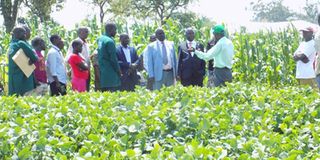Uganda has had only seven seed inspectors since 2007, report reveals

A survey done by the African Seed Access Index (TASAI) between 2016 and 2018 has indicated that Uganda has only seven specialized personnel for inspecting the quality and quantity of seeds, the lowest number as compared to the other African countries. FILE PHOTO
What you need to know:
According to the report presented at Golden Tulip Hotel in Kampala on Wednesday, Uganda trails the African countries with no private inspector and only seven general inspectors, followed by Senegal, which has 21 inspectors. Mozambique follows with 25, Ethiopia and Ghana follow with 32 inspectors each and then Malawi with 37 inspectors.
A survey done by the African Seed Access Index (TASAI) between 2016 and 2018 has indicated that Uganda has only seven specialized personnel for inspecting the quality and quantity of seeds, the lowest number as compared to the other African countries.
According to the report presented at Golden Tulip Hotel in Kampala on Wednesday, Uganda trails the African countries with no private inspector and only seven general inspectors, followed by Senegal, which has 21 inspectors. Mozambique follows with 25, Ethiopia and Ghana follow with 32 inspectors each and then Malawi with 37 inspectors.
South Africa leads the list in Africa with 180 private inspectors and 580 general inspectors followed by Zambia, which has 83 private inspectors and 118 general inspectors. DR Congo follows with 105 general inspectors, then Zimbabwe comes next with 46 private inspectors and 60 general inspectors.
“Seed inspection is the mandate of National Seed Certification Services (NSCS). Unfortunately, NSCS has significant shortage of inspectors, employing just seven since 2007. This shortage is due to the inadequate financial means at the institutions disposal. In 2014, NSCS had a budget shortfall of 70 per cent for staffing of inspectors (Naluwairo and Barungi, 2014). Seed companies rate their satisfaction with seed inspection services as fair as 59 per cent,” reads the report in part.
This report comes after farmers have called out to the government to prevail over maize, millet and other seed prices.
A story published in this paper indicated that prices of seeds had vehemently dropped in the prices and Maize dropped from Shs800 to Shs300 a kilogram, Sorghum from Shs800 to Shs200, Millet grain from Shs1, 200 to Shs650, Green gram from Shs3,000 to Shs1,000 and Groundnuts from Shs4,500 to Shs3,000.
Sector players indicate that the fall in the prices of seeds are as result law inspections leading to production of low quality of seeds.
The TASAI reported that Uganda trailed two places above the bottom of the list of the quality seed performance.
Malawi is last on the list with quality rate of 54 per cent, DR Congo follows with 58 per cent and then Uganda is in the third bottom place with 60 per cent.
The list is led by Zimbabwe at 83 per cent and South Africa at 79 per cent. Ghana with 78 per cent and followed by Zambia and Senegal at 77 and 76 respectively.
Ms Emma Joynson-Hicks, the managing director of Ag-Verify, an independent inspection body said Uganda has a big hurdle to jump if they will change a bad reputation in the whole world about Ugandan seed.
“People around the world cannot buy Ugandan seed because they either think it is counterfeit or of low quality. This has brought about the low prices and we in the diaspora have not been given the chance by the government to inspect the reason as to why it is the way it,” Ms Hicks said.
Mr Mainza Mugoya, the regional coordinator of TASAI said the problem comes with lack of funds to employ the inspectors.
“There is a small budget for inspection of our seeds in Uganda. That has left the trend so bad and yet the country that has its backbone on agriculture needs quality for production,” Mr Mugoya said.
Mr Grace Musimami, the publicity secretary of the Uganda Farmer’s Federation said the farmers have been affected with the poor quality seed and asked government to intervene.
“There is a degeneration of the seed on the market and this affects farmers. We hope government can come and rectify the problem as soon as possible,” Mr Musimami said.



